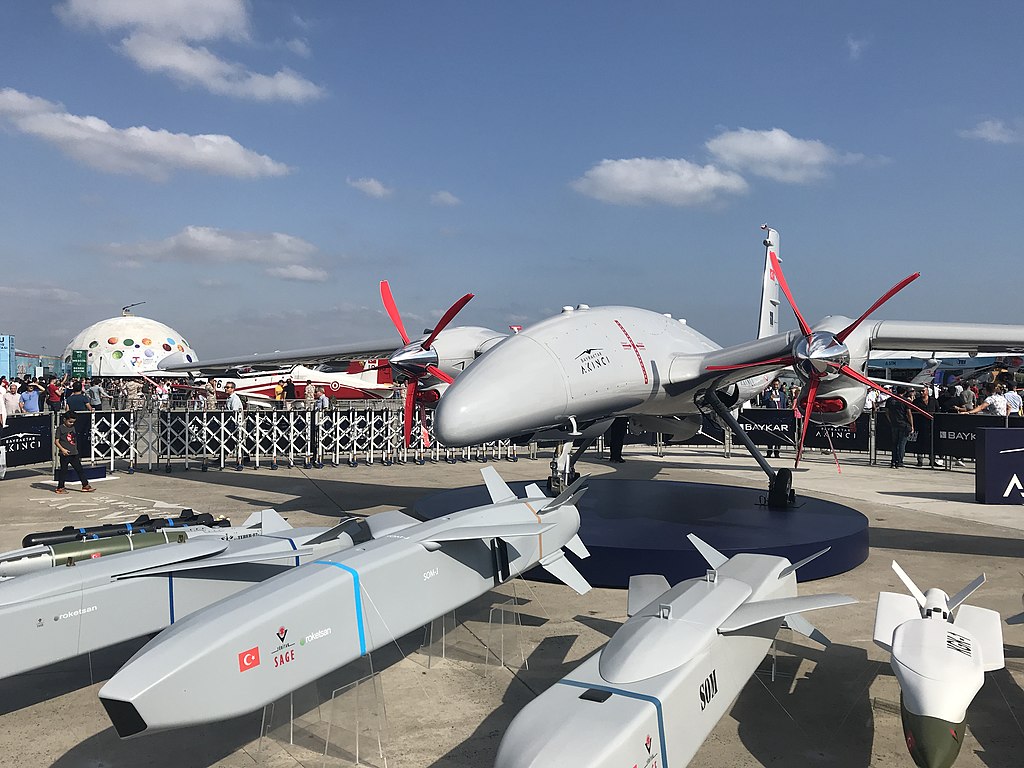
Turkish Bayraktar Akıncı UAV on display at Teknofest Aerospace and Technology Festival in 2019.
“…Thanks to these agreements, hundreds of companies producing subsystems in the Turkish defense and aviation industry will expand their export portfolios…”
There is a growing perception that Arab Gulf monarchies are intent on diversifying their defense and security partnerships beyond the United States’ security umbrella. A recent analysis in the prominent Saudi-owned monthly magazine al-Majalla argues that this new “multi-polar Gulf security” architecture is caused in part by the perceived decline in U.S. security commitments. Turkey, the article argues, is among the key countries ready to play a greater role in Gulf security.[i]
A key element of Turkish global military influence has been the success of its UAV exports, especially the Bayraktar TB-2 drones, manufactured by the Turkish company Baykar.[ii] In September 2022, the UAE placed an order for 120 TB-2 drones—at that time, the largest order ever.[iii] With reports of limited TB-2 inventory due to production constraints and high export demands, the deal was expected to have a localization component whereby some of the elements of manufacturing and production would occur on Emirati soil. Baykar delivered 20 units to the UAE shortly after the deal was announced. Since then, there has been no official follow-up or public reporting on the matter. However, the 2022 Emirati deal has officially been eclipsed in value by a Saudi-Turkish deal for Akinci UAVs—the most advanced drone made by Baykar—signed during Turkish President Erdogan’s mid-July 2023 visit to Saudi Arabia. Baykar CEO Haluk Bayraktar explains that the deal not only helps align Turkey and Saudi defense sector priorities but is expected to have a positive windfall across Turkey’s defense industry, according to the second accompanying excerpt, from an interview published in the global defense-focusednewswebsite Breaking Defense. The deal has an explicit localization component stipulating that up to 70 percent of each unit could be produced in Saudi Arabia.[iv] Involving Saudi military industry in the production process will not only ease the pressures on production in Turkey, but will also meet key Saudi “Vision 2030” goals for its domestic defense industry.[v] It will also provide a major boost to Saudi capabilities, after its arsenal of Chinese import UAVs have underperformed in the Yemen conflict.[vi] Turkey, meanwhile, is receiving a much-needed influx of Gulf money in the hopes of stabilizing rampant inflation and persistent economic volatility.
Sources:
تركيا… الوافد الأمني الجديد إلى الخليج (Turkey… the new entrant to Gulf security),” al-Majalla (Saudi-owned news magazine), 24 July 2023. https://tinyurl.com/ktky387m
The repercussions of regional fluctuations and the obligations to compensate for the decline in the level of United States security commitments have prompted the Arab Gulf states to change their strategies on three levels: diversification in sources of arms supplies, diversification in partnerships, and diversification in alliances. Although the United States remains by far the most important security player in the Gulf, diversification strategies have opened the door for regional, external, traditional, and newcomer actors such as China, India, Russia, and Turkey to become involved in the Gulf region. This situation has led to what can be called “multi-polar Gulf security,” which raises many questions about the prospects for Gulf security and the potential role of newcomers in the region…
It is difficult to predict the future in a highly volatile and unstable region, especially with the countless variables involved in each situation. However, with the current trend of the United States continuing to detach from the region and in light of Turkey’s rising regional position and rapid leaps in the defense industry, Ankara may have an opportunity to strengthen its position in the Gulf and advance towards an enhanced security role. However, internal, regional, and international dynamics must always be taken into account, and Turkey should stabilize its domestic politics, enhance its economic strength, and significantly increase its trade interaction with the Gulf states to compete with actors from outside the region and facilitate a potentially enhanced security role in the future.
“Baykar CEO hopes massive Saudi deal paves path for Turkish defense firms in KSA,” Breaking Defense (global defense-focusednewswebsite), 10 August 2023. https://breakingdefense.com/2023/08/baykar-ceo-hopes-massive-saudi-deal-paves-path-for-turkish-defense-firms-in-ksa/
“Our partners ASELSAN and ROKETSAN, with whom we collaborate, have also entered agreements with NCMS based on their technological capabilities. Thanks to these agreements, hundreds of companies producing subsystems in the Turkish defense and aviation industry will expand their export portfolios through new collaborations in this field,” Bayraktar said…“…Joining forces with the Saudi defense industry will accelerate Baykar’s rate and capacity of production, which is crucial to meet the burgeoning demand for the Turkish unmanned aerial solutions,” Kasapoglu said…
Notes:
[i] For background see: Ali Bakir, “Turkey’s defense industry is on the rise. The GCC is one of its top buyers,” The Atlantic Council, 4 August 2023. https://www.atlanticcouncil.org/blogs/menasource/turkey-defense-baykar-gcc-gulf/
[ii] For more on Baykar and Turkish drone exports, see: Karen Kaya, “Turkey as a Drone Superpower: A Case Study of a Mid-Size Power Driving the Operational Environment,” FMSO’s Foreign Perspective Brief, 28 March 2023. https://fmso.tradoc.army.mil/2023/2023-03-28-turkey-as-a-drone-superpower-a-case-study-of-a-mid-size-power-driving-the-operational-environment-karen-kaya-update/
[iii] Over the past decade, Turkey’s military influence among Gulf countries was centered on its close defense and security relationship with Qatar. Turkish relations with Saudi Arabia and the UAE were strained for much of the 2010s. They thawed in 2021 when the Qatar embargo ended and a broader regional rapprochement began.
[iv] Jeremy Binnie. “Local production agreements signed for Saudi Bayraktar Akinci UAVs,” Jane’s, 8 August 2023. https://www.janes.com/defence-news/news-detail/local-production-agreements-signed-for-saudi-bayraktar-akinci-uavs
[v] For more on the defense industry component of Saudi Vision 2030, see: Lucas Winter “Saudi Arabia and China in the Arabian Sea,” OE Watch,October 2016. https://community.apan.org/wg/tradoc-g2/fmso/m/oe-watch-past-issues/195241; Lucas Winter, “Saudi Arabia and the UAE Streamline Military Industry,” OE Watch,January 2020. https://community.apan.org/wg/tradoc-g2/fmso/m/oe-watch-past-issues/307562; and Lucas Winter, “Saudi Arabia’s Domestic UAV Program Slow To Get Off the Ground,” OE Watch,01-2022. https://community.apan.org/wg/tradoc-g2/fmso/m/oe-watch-past-issues/403476
[vi] See: Lucas Winter, “UAV Technologies Proliferating in Yemen and Saudi Arabia,” OE Watch,07-2022. https://fmso.tradoc.army.mil/2023/oe-watch-vol-12-iss-07/
Image Information:
Image: Turkish Bayraktar Akıncı UAV on display at Teknofest Aerospace and Technology Festival in 2019.
Source: https://commons.wikimedia.org/wiki/File:Bayraktar_Akıncı_SİHA_%28UAV%29.jpg
Attribution: CC 4.0

